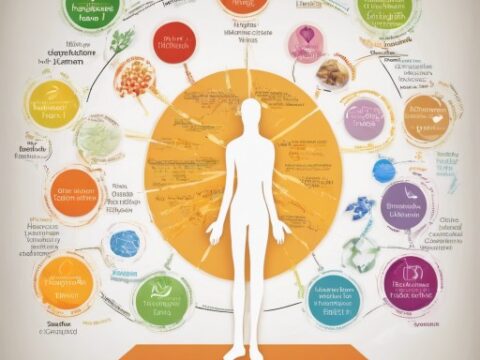
Understanding the Gut Microbiome: A Guide to Improving Digestive Health
Introduction
Your gut microbiome, or the community of trillions of bacteria residing in your intestinal tract, plays a crucial role in your overall well-being. Not only is it responsible for maintaining a healthy digestive system, but recent research suggests that it also influences other aspects of our health, including our immune system, mental health, and even weight management. In this comprehensive guide, we will delve into the world of the gut microbiome and explore effective strategies to improve its health and enhance your digestive well-being.
The Gut Microbiome: Natures Hidden Powerhouse
Our gut microbiome is an intricate ecosystem consisting of diverse microbial species that work together to maintain our health. These microorganisms, including bacteria, viruses, fungi, and archaea, reside in our gastrointestinal tract, specifically the colon. While some of these organisms may sound daunting, they are essential for our survival.
This bustling community of microbes has various roles within our bodies. They aid in digestion and absorption of nutrients, produce essential vitamins, help regulate our immune system, and even communicate with our brain via the gut-brain axis, influencing our mental health and overall mood.
Factors Affecting Gut Microbiome Diversity
The human gut microbiome is as unique as a fingerprint, varying from person to person. However, some factors can influence the diversity and composition of these microorganisms. These may include:
1. Diet: The food we consume acts as a fuel for both us and our gut bacteria. A diverse, fiber-rich diet promotes the growth of beneficial bacteria and supports a healthy microbiome. On the other hand, a diet high in processed foods, sugar, and unhealthy fats can negatively impact gut health.
2. Antibiotics: While antibiotics are essential in fighting bacterial infections, they can also disrupt the delicate balance of our gut microbiome. It is crucial to use antibiotics judiciously and, when necessary, consider taking probiotics or prebiotics to restore and maintain the microbial balance.
3. Stress: Chronic stress can disturb the balance of gut bacteria, affecting digestion and immune function. Implementing stress-reducing techniques such as meditation, exercise, and adequate sleep can positively influence gut health.
Enhancing Gut Microbiome Health
Now that we understand the importance of a thriving gut microbiome and the factors that influence it, lets explore some practical ways to improve its health:
1. Consume Fiber-Rich Foods: Fiber is the preferred energy source for beneficial gut bacteria. Incorporating a variety of whole grains, legumes, fruits, and vegetables into your diet can boost the growth of beneficial bacteria.
2. Enjoy Fermented Foods: Fermented foods, such as yogurt, sauerkraut, kimchi, and kefir, are rich in probiotics, which are beneficial bacteria. Including these foods in your diet can introduce healthy microbes to your gut.
3. Limit Processed Foods and Added Sugars: Highly processed foods and excessive sugar intake can disrupt the balance of gut bacteria, leading to inflammation and various digestive issues. Opt for whole, unprocessed foods whenever possible.
4. Consider Probiotic Supplements: Probiotics are live bacteria that can provide numerous health benefits when consumed in adequate amounts. Consult with a healthcare professional to choose the right probiotic supplement for your specific needs.
5. Regular Physical Activity: Exercise not only promotes overall well-being but also influences the diversity and abundance of gut bacteria. Aim for at least 30 minutes of moderate-intensity exercise most days of the week.
6. Prioritize Sleep: Sufficient sleep is essential for maintaining a healthy gut microbiome. Aim for 7-8 hours of quality sleep every night to support optimal gut health.
7. Manage Stress: Chronic stress can disrupt the delicate balance of the gut microbiome. Prioritize stress management techniques such as deep breathing, yoga, or mindfulness meditation to promote gut health.
Conclusion
Understanding and nurturing your gut microbiome is key to improving your digestive health and overall well-being. By adopting a fiber-rich, whole foods-based diet, incorporating probiotics, and managing stress, you can positively impact the composition and diversity of your gut microbiome. Remember, small changes can make a big difference, so start implementing these strategies today and reap the benefits of a happier and healthier gut.

